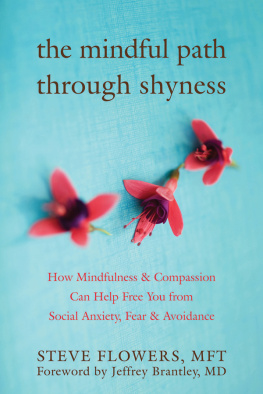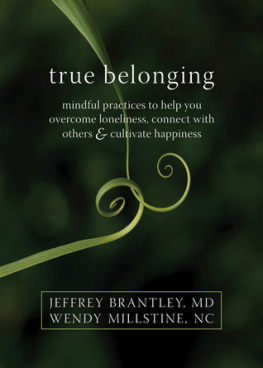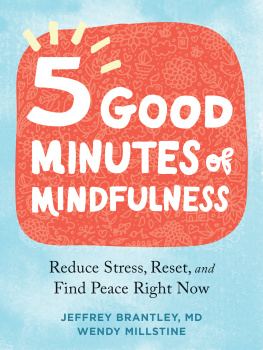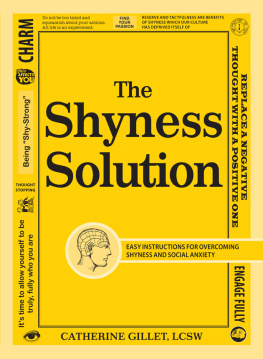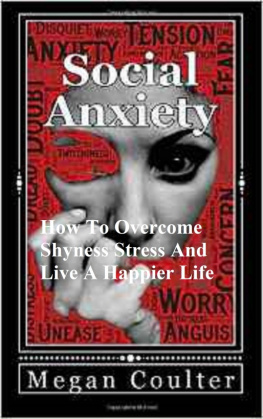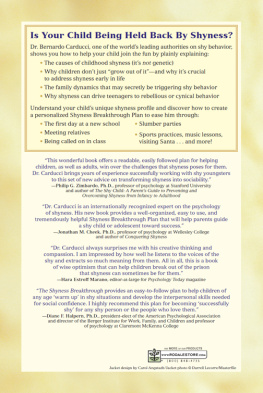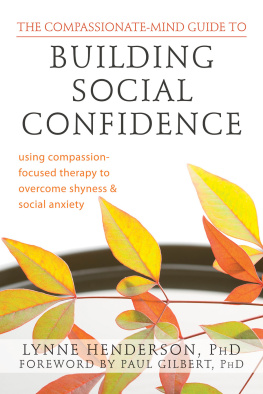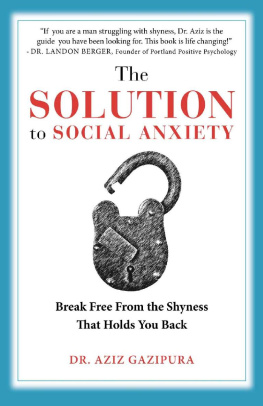acknowledgments
As I read over this book, I hear the echoes of many voices that are not my own and feel so much gratitude for the generosity, wisdom, and beauty of the hundreds of friends and teachers who fill its pages, as well as my heart. I can name only a few of them here.
My heartfelt love and gratitude go out to my dear friend Bob Stahl, who not only embodies compassion and wisdom, but gives freely of himself to everyone fortunate enough to know him; to Jon Kabat-Zinn, whose wisdom and generosity of spirit are a light in the world; and to Saki Santorelli, for his many gifts of kindness, clarity, and love.
I have the greatest appreciation for my skillful and patient editors at New HarbingerJasmine Star and Jess Beebewho contributed so much goodwill, wise guidance, and clarity to the creation of this book; Wendy Millstine, whose initiative in acquiring this book set the whole great wheel in motion: and Jess OBrien, whose editorial midwifery saw this book through from its earliest conception to its completion in print.
I am deeply grateful to all of the people who gave so generously of their time to read and reread the drafts of this book and offer their reflections and support, especially Bob Stahl, Lynne Henderson, Kristy Lin Billuni, Marcia Tarabini, Howard Blumenfeld, Florence Meyers, Melissa Blacker, Beth Roth, Jeffrey Brantley, and Susan Kaiser Greenland. I also wish to thank Sharon Salzberg, Tara Brach, Daniel Siegel, Zindel Segal, Bill Martin, and Gregory Kramer for their generosity of spirit and willingness to read my work and offer their support.
Of all those that have made this book possible, my wife Mary has given me the most. She has not only supported me with her wisdom, patience, and tolerance, but has taught me so much of what love is through her own loving kindness, forgiveness, and compassion, that I might dare to share these gifts of the heart with others. To her I owe the heart of this book.
Steve Flowers, MFT, conducts mindfulness-based stress reduction online programs and is the founder and director of the mindfulness-based stress reduction clinic at Enloe Medical Center in Chico, CA. He also works in private practice as a psychotherapist.
Foreword writer Jeffrey Brantley, MD, is a consulting associate in the Duke Department of Psychiatry and the founder and director of the Mindfulness-Based Stress Reduction Program at Duke Universitys Center for Integrative Medicine. He is author of Calming Your Anxious Mind.
The Mindful Path Through Shyness Program
Participating in Steve Flowers eight-week Mindful Path Through Shyness Program can greatly help you on your personal path through shyness and social anxiety. The program and its accompanying workbook are free and can be downloaded from www.mindfullivingprograms.com. Also available at the website are audio/visual recordings to assist you in your meditation practice, an online Mindful Path Through Shyness Forum, and information about Flowers eight-week online class.
1. the nature of shyness
The mind is its own place, and in itself can make a Heaven of hell, a hell of Heaven.
John Milton
Life is fraught with peril. From our very first breath, all of us are sensitive and vulnerable and cannot avoid illness, injury, and death. We cant survive without one another, yet we also cant avoid being separated from one another. We will hurt and be hurt by one another in many ways. The experience of shyness involves being exquisitely sensitive to interpersonal peril and seeking to protect yourself from the pain inherent in relationships.
Given that you experience a lot of shyness, one of the ways you may have chosen to protect yourself is by avoiding significant interpersonal relationships altogether. This is logical as it prevents a great deal of pain and angst, and in the short run it worksyou do feel less anxious. The problem is that youre then stuck with all of the difficulties that come with not having significant relationships, like loneliness. This is a particularly painful problem when you feel angry and critical, and with no one else to talk with, you may end up judging and blaming yourself. Unfortunately, people with shyness can often spend a lot of time doing just that.
Theres a particular kind of suffering you experience with shyness yet you want the things that successful relationships can bring, like loving and being loved, a sense of belonging, or even advancing in your career. The very thing you want makes you feel anxious. The purpose of this book is to help with this kind of suffering.
Shyness is made up of characteristic thoughts, emotions, sensations, and behaviors that are entirely malleable and within your power to change. In this chapter, well explore how various thoughts, feelings, and behaviors come together to create shyness.
our lives are made of patterns
We create habitual patterns of behavior in our lives and then live in them. Some we create consciously, like a morning jog, but most of our patterns are formed unconsciously by repeating certain thoughts, feelings, and actions so often that we become stuck in them. Research has shown that problematic shyness has core components of self-blame, private self-consciousness, shame, and resentment (Henderson, Zimbardo, and Carducci 2001). These habits of mind operate automatically and often unconsciously, below the threshold of awareness. They are something we do, not something we are, and once created and in place, they are generally predictable and arise instantly on cue.
Imagine going into a restaurant at lunch intending to sit and eat, but a coworker sees you enter and jumps up to invite you to join him and three others for lunch. You immediately feel nervous, smile, and thank him for the invitation but make up an excuse, telling him you just came in for some takeout. You flee to the takeout counter. You didnt plan this reaction to an unexpected invitation; it came automatically. As you leave the restaurant, you feel a flood of relief, but you also feel frustrated and self-critical. You really dont want to end up eating lunch in your car, and you may wonder whats wrong with you and why you cant be more sociable.
As a person struggling with shyness, you have your own unique blend of mental and emotional habits that forms and perpetuates your individual shyness pattern. The pattern is automatic and hard to control and can create much pain and suffering in your life. As in the movie Groundhog Day, we tend to remain stuck in unexamined ways of doing things, repeating the same pattern day after day. Youre likely to remain stuck until you can find a perspective that allows you to explore and understand your mental and emotional patterns without being controlled by them.
Its important to get beyond your problematic shyness patterns so that they dont automatically define and limit your life. You need to begin looking at the patterns themselves and trying to understand how they work. Are they rigid or flexible, changing or unchanging? How well do they serve you? How are those patterns created by your thoughts and emotions, and how do they drive what you do?
We usually dont look deeply into these patterns or understand them well. In fact, were usually swept along in the same deeply ingrained habits we developed as very young children. But we do have the ability to examine these things and recognize how were repeating old and sometimes painful patterns, and this is where mindfulness is so valuable. The more we look into our life patterns, the more we can take them off automatic pilot. There are many ways to respond to any given situation. Mindfulness can help you find new responses to old triggers so that you can live more in accordance with your highest values.
One way to arrive at a more deliberate, mindful response is to pause at a trigger point, at least for a moment or two, before you do anything at all. Within that mindful pause, you may notice that you can respond rather than react to the situation. In the example above, you might pause and reflect for a moment before responding to your coworkers invitation to have lunch together. You may still decide you dont want to join the group, but now this decision came from a choice, rather than a knee-jerk reaction. Its perfectly alright to sit alone to eat if thats what you want to do, but its also perfectly alright to sit with your coworkers even if you do feel uncomfortable.

